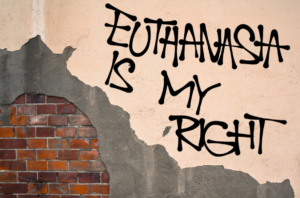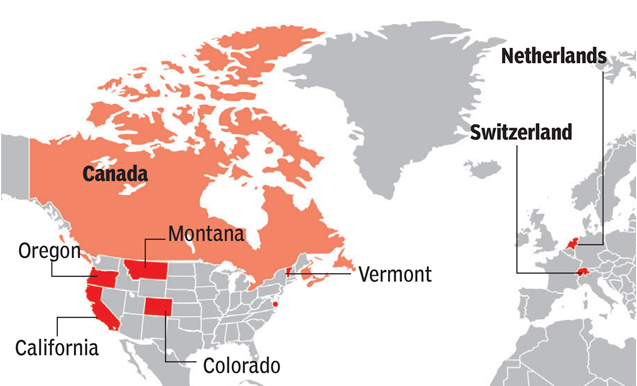
The Supreme Court has passed a ‘Living Will’ to legalise passive euthanasia in India. As per the court’s judgement, a terminally-ill patient in the persistent vegetative state can take out a ‘living will’ or an ‘advance medical directive’ to die with dignity.
The court has framed principles governing the execution of advance directive or ‘Living Will’. Let’s have a look at the working of a Living Will.
What is a Living Will?
Also known as an advance medical directive, Living Will is an instrument through which a person can state to end their life care in the future when they would not be in a position to take the decision. In simple words, a person can make a Living Will today to state that in case of any terminal illness in the future then he/she should be allowed to die.
Who Can Draft a Living Will or Advance Medical Directive?
Any adult who is healthy and can communicate, relate and understand the purpose and consequences of the document can prepare a Living Will. Further, it should be voluntary and in writing.
What Should Living Will Contain?
A Living Will state the conditions under which the medical treatment can be withheld or withdrawn. The document should mention the name of the ‘guardian or close relative’ who will give final approval for initiating the passive euthanasia. In case there are more than one Living Will, the latest one will be considered.
How to Save Advance Medical Directive?
The Living Will has to be attested by two independent witnesses and preferably countersigned by the Judicial Magistrate First Class (JMFC). Further, the JMFC will preserve one hard copy along with the other in the digital format in its office.
Then JMFC will forward a copy of the Living Will to the Registry of the District Court and also inform the immediate family of the executor. A copy of the Living Will shall be handed over to the official of the local government, municipal corporation or panchayat concerned. Also, the authority will nominate a custodian for the Living Will.
How to Execute Living Will or Advance Medical Directive?
If a person becomes terminally ill and is going through medical treatment with no hope for recovery, the treating doctor has to ensure the genuineness and authenticity of the document received from JMFC before acting upon the same. Also, the Living Will should be implemented only after being satisfied that the patient is
- Terminally ill
- Going through prolonged treatment
- Surviving on life support
- Suffering from an incurable ailment
The hospital where the patient has been admitted has to form a medical board consisting of the head of the treating department along with at least three experts from the fields like cardiology, neurology, general medicine, oncology and psychiatry. All these medical experts should have the minimum 20 years of experience. These doctors have to visit the patient in the presence of a guardian or close relative. Doctors would give their opinion to certify or not certify the instructions mentioned in the Living Will.
If the hospital medical board approves, follow the instructions as stated in the advance directive.
In case of change, the collector shall form another medical board that should comprise of the chief district medical officer as the chairman and three other expert doctors from different fields like neurology, general medicine, cardiology, psychiatry or oncology.
The chief district medical officer, who is the chairman of the medical board and nominated by the collector, has to inform JMFC before initiating the withdrawal of the medical treatment. The JMFC will visit the patient at the earliest, and after the careful inspection of all the aspects, it will authorise the implementation of the board’s decision.
Here are Some of The Countries Which Allow Euthanasia
What If the Medical Board Denies the Permission?
If the medical board withdraws the permission to withdraw the treatment, the patient or his family members or even the attending doctor or hospital staff can reach the high court. Here, the chief justice of the high court will constitute a division bench to decide the case.
How Will Living Will Impact Payout of Life Insurance Policies?
While the Living Will gives the right to die with dignity, it has also raised doubts over the insurance policies to pay out. Like: Will life insurance policy makes a payout if the end doesn’t count as normal death? Would it not be viewed as suicide by a life insurance company in India?
However, some financial consultants opine that life insurance companies have to honour their commitments even if they equate passive euthanasia with suicide.
The standard clause governing suicide in life insurance policies say— the policy shall become void if the policyholder commits suicide within one year of policy issuance.
However, from 1st January 2014, the Insurance Regulatory and Development Authority of India (IRDAI), the apex insurance regulatory, mandated the life insurance companies to make some payment to the kin even if a policyholder died due to suicide within a year of policy issuance.
The Supreme Court Verdict has brought some respite for patients and their families who are suffering from an incurable disease. After all, “Right to die with dignity is as imperative as Right to live with dignity”.
1,896 total views, 0 views today


The word Euthanasia is derived from Greek words “eu”and “thanatos ”which means “good death” or “easy death”, involves providing deliberate death to terminally ailing patient in order to alleviate such patient of intractable and unbearable pain or suffering”. It is also known as Mercy Killing.
The Northern Territory of Australia was the first country to legalize euthanasia. It did so by passing the Rights of the Terminally Ill Act, 1996. In Netherlands, Belgium, Colombia and Luxembourg euthanasia is legal. Switzerland, Germany, Japan and some states in the United States of America permit assisted suicide while in nations like Mexico and Thailand, mercy killing is illegal.
http://www.omilights.com/euthanasia-conflict-between-life-and-death/